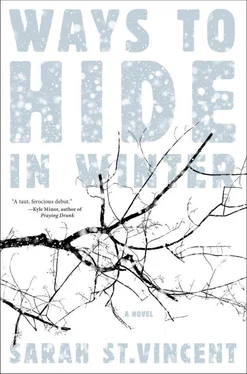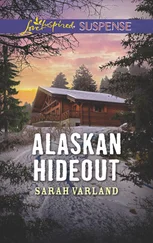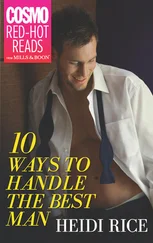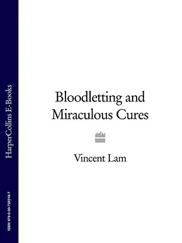“Oh, no, I don’t want to trouble you. In fact, I’m really just looking for the man—the, ah…whoever runs this little hotel, up the hill. I thought you might know where he was. Or she.” He tugged the scarf down, revealing thin lips and cheeks that were sunken, famished-looking, maybe feverish. He was young, I thought—or at least, a few years younger than I was. Maybe twenty-five.
“He’s away. He won’t be back until tomorrow.”
The stranger fingered the buttons on his coat, considering this piece of information. “Is there somewhere else to stay?”
“No.” I looked him up and down, beginning to grow curious in spite of myself. “It’s a state park. There’s nothing around here for miles. You’d have to go into town.”
His eyebrows drew together, and he leaned back slightly. “Ah.” A thoughtful pause. “You mean…”
“Carlisle. It’s about ten miles north of here.”
“Ten miles,” he echoed. “I see.”
Behind him, through the screen door, I could see the snow, even heavier now. A gust of cold reached me where I stood, still pressing a hand against my side, as if to silence a voice there.
The stranger looked over his shoulder, rubbing his bare fingers together as he took in the same sight. As I watched him, my conscience began to get the better of me; even so, I was surprised to hear myself speak.
“I have a key to the hostel,” I said. “I could probably let you in.”
He turned back to me. “Really? That would be most kind of you.”
“Just until Martin gets back. Then you’ll have to talk to him. I’m not sure if he’ll want to keep the place open for just one person.”
The key was on a hook behind the ice cream case, empty at this time of year except for a lone and inexplicable drum of strawberry, which I dipped into from time to time as I sat at the counter and read. Sometimes entire days went by without anyone coming in. The store’s owner, a placid and forgetful man, long since retired to South Carolina, made most of his money during the summer; he kept me on during the colder months largely out of charity, I knew. I reached for the key without taking my eyes off the stranger.
“Is your car in the lot out here?”
He removed his hat and held it in his hands, knitting his long fingers into the fabric. His hair was limp and untrimmed. “No, I—I don’t have a car, actually.”
“You walked?” His shoes were odd, resembling dress shoes but cheap and rubbery, with heavy soles and fragile-looking laces. Not at all suited for hiking, and possibly not even suited for walking.
“No, I was given a ride. It would be a long way to walk, wouldn’t it?”
I realized I was squinting at him, this man with the peculiar face and even more peculiar accent. “It would.”
“My bag is on the porch,” he said, still fingering his hat. “But of course, I can carry it.”
“All right.” I reached for my coat and pulled it on, fastening the buttons. It was long and gray, left over from my time in college, still warm despite the holes in the lining that I’d never bothered to fix. In a few more years it would grow visibly shabby, and then I would consider replacing it, but in the meantime there wouldn’t be anyone to notice. My grandmother, with whom I lived, was increasingly blind.
He did have a suitcase, small and blue and wheeled. We stepped out from under the porch awning and walked side-by-side to the path that led up the hill. Above us, the hostel was still dark, a lonely mass of brick. Once a dormitory for the ironworkers who had journeyed across the sea from Ireland, Scotland, Germany, it was now a barebones refuge for the masses who came through on the trail—the Appalachian Trail, the one that put us on the map—in the summer. I unlocked the entrance, handed the stranger a set of sheets and towels, and showed him where to sign his name in the guest book. “You can pay Martin tomorrow. That’s the manager. Pick any room with a cot in it.”
“Thank you,” he said, but I was already stomping outside in my heavy boots, going home.
—
The next morning’s light was thin and gray, the clouds hanging over the sun. It was still snowing. I rolled over in the cold sheets, drawing the afghans around me. The pills sometimes made me forget where I was upon waking, giving me a long moment of confusion as I examined the stains on the ceiling. The feeling never lasted for long, though. Everything came back eventually, even if it didn’t always come back all at once.
I did my best to stay wrapped in the blankets as I sat up and leaned against the wall, letting the world come into focus from my place on the mattress on the floor. Through the window, I could see the field with its mossy brown Herefords, the bleak gash of Route 233, the family plot with its row of gently leaning headstones. It was Sunday, and somewhere across the fields a bell sounded. A horse and cart appeared on the road and passed with the rhythmic, fading sound of hooves. Probably a Mennonite family heading to the church a few miles west in Walnut Bottom, I thought, gripping a blanket under my chin. Sometimes I wondered if they really felt as religious as they looked, the Mennonites, with their men in somber black hats and their women in those plain dresses and stiff-looking hairnets. Maybe they just got into the habit of doing things the way they did them, and that was why they bothered to rig up a horse and buggy every Sunday, even in the winter.
Aside from them, not a soul seemed to be stirring; even the cows were lounging on their sides, watching over their shoulders as the buggy receded out of sight. The railroad tracks that passed by the house were silent, stretching emptily to the east and west.
After a little while, there was a shuffling sound downstairs, a cough, a stream of water pouring from a tap. I could picture my grandmother standing in front of the kitchen sink in her robe, clutching a glass of water, returning to bed. Sure enough, the shuffling soon retreated in the direction from which it had come. Outside, a dog barked several times, as if it had spotted a stranger, and then stopped.
The stranger. Rubbing my eyes, I pushed myself to my feet and walked down the hall to the bathroom, turning the knob in the shower. If he was still on the mountain, I realized as the water struck my skin, then he was alone there, probably with no food. Martin’s closet-sized kitchen rarely contained more than bread and milk, and the hunters would be crouched in silent, camouflaged lumps in the woods by now. Martin himself would be dealing rummy hands at the United Methodist nursing home in Carlisle until the evening.
I could have called him, told him he had a guest.
Instead I got into the Jeep and set off toward the winding roads that led upward.
Who was this stranger? Russian? Greek? I had never met a Russian, or any Greeks aside from the dark-haired, weary-looking family who ran the diner in Carlisle, but couldn’t think of any other guesses. A married man, it seemed—I had glimpsed a gold band the previous day—but alone. Alone in rural Pennsylvania, in the woods. A state park built around some flooded quarries and an abandoned iron smelter. An empty hostel next to a store that sold little more than firewood and beans. A place that was miles away from anywhere, where even the telephone and electricity lines were unreliable thanks to the fire that had swept over the mountain a few months earlier. I couldn’t understand it.
There was just no reason for a person to be there in December unless he was searching for a quiet place to shoot deer.
The radio signal faded as I made the steep climb, passing through the stands of live pines and, every few hundred yards, the stands of burned ones. Birches and maples. A few red oaks. The maples, when I noticed them, always made me think of the two trees in the yard behind my grandmother’s house—the ones my father had planted when my brother and I had been born. It was my brother who had taught me to keep cars like this one running, or rather, had let me watch while he taught his friends; the rest I’d eventually figured out myself. I listened to the murmur of the engine as I steered around a bend, the whispering sound as snow and ice gave way under the tires.
Читать дальше












